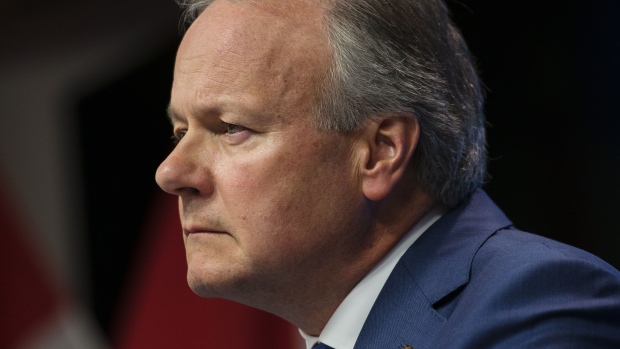Jan 9, 2019
Poloz faces 'narrow pocket' for more rate hikes: Economists react to BoC decision

The Bank of Canada held its overnight benchmark interest rate at 1.75 per cent for a second straight decision Wednesday, stating that the economy is experiencing a temporary slowdown as it copes with slumping oil prices and adjusts to previous rate increases.
The central bank’s decision was in line with recently pared back expectations from economists and markets for additional rate hikes.
Here’s how economists are reacting to the Bank of Canada’s announcement so far:
“The most important line … is that the Bank of Canada is still telling us they’re going to the neutral range. This is why this is so important: The neutral range for Canada per the Bank of Canada’s expectations is 2.5 to 3.5 per cent, which suggests to us – we’re only at 1.75 right now – that the Bank of Canada still wants to hike at least three more times. That is completely at odds with the market pricing right now, which is for zero hikes left in 2019 … The big problem here is that 2020 looks like it’s going to be a noticeably soft year for global growth and particularly for U.S. growth. So in my opinion, the Bank of Canada has a fairly narrow pocket to get in those hikes towards the neutral rate probably in the first half of this year, or not at all.”
- Frances Donald, head of macroeconomic strategy, Manulife Asset Management
“The Bank of Canada has taken itself out of the rate hike game, and its message today suggests that it isn't quite as sure about when it will come off the sidelines and hike again. As we expected, the rate message wasn't that they were done for good, but rather, that the timing will be a bit more extended, adding the words ‘over time’ to the paragraph that refers to the need to get rates into the neutral range.”
- Avery Shenfeld, managing director and chief economist, CIBC Capital Markets
“The key point is that the bank continues to think that further interest rate hikes are necessary, despite a host of factors that are weighing on the outlook. Nevertheless, the tone of the statement was clearly more dovish than December … If we’re right that even the bank’s new lower economic growth forecasts will prove too optimistic, then there is little prospect of further rate hikes.”
- Stephen Brown, senior Canada economist, Capital Economics
“We think [there’s a] 50 per cent or so chance of a hike this year – that’s probably pretty fair – but I think we’re in pretty volatile circumstances at this point in time … 40 per cent chance actually, a little less than 50 per cent. With wages coming off pretty substantially in the past six months, there’s no reason to hike rates.”
- Ed Devlin, head of Canadian portfolio management, PIMCO
“The five interest rate hikes since mid-2017 are having a more substantial impact on spending than the Bank expected. A short-term pause in rate hikes is now likely. The economy slowed considerably in the fourth quarter of last year, which will continue in the first quarter of this year, owing to the decline in oil prices and the Alberta government's implemented oil production cuts.”
- Sherry Cooper, chief economist, Dominion Lending Centres
“No big surprise here. The roller coaster ride of the past few months has brought a note of greater caution to the Bank of Canada's communications, and today's decision looks to be an extension of that. Governor Poloz and company still see more rate hikes down the road, but aren't in any great rush to get there … As near-term shocks fade, the Canadian economy should get back on track, with some modest inflationary pressures to match. For this reason, we continue to pencil in another rate hike this spring. This is of course contingent on the economy evolving as expected.”
- Brian DePratto, senior economist, TD Economics
“If there [were] any surprise[s] in today’s messaging – and there weren’t many big ones – it was that the Bank sounded a tad more committed to further rate hikes down the line than the market was likely expecting … The key takeaway is that we remain comfortable with our call of two rate hikes later this year, with the first possibly in Q2 and the second in Q4 (after October’s federal election).”
- Doug Porter, chief economist and managing director, BMO Financial Group

